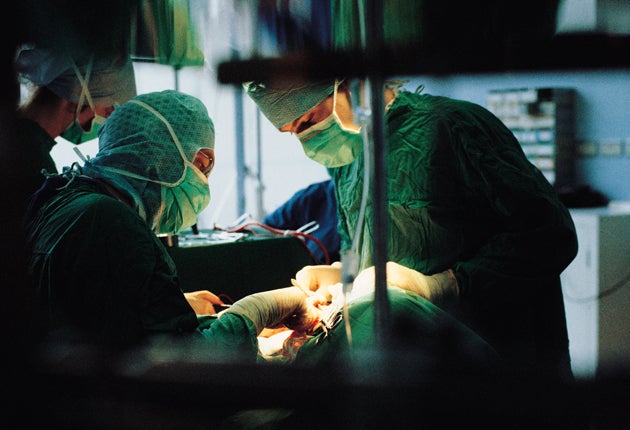NHS cuts patient death rate
Number of fatalities following accidents or mistakes falls 37 per cent

Your support helps us to tell the story
From reproductive rights to climate change to Big Tech, The Independent is on the ground when the story is developing. Whether it's investigating the financials of Elon Musk's pro-Trump PAC or producing our latest documentary, 'The A Word', which shines a light on the American women fighting for reproductive rights, we know how important it is to parse out the facts from the messaging.
At such a critical moment in US history, we need reporters on the ground. Your donation allows us to keep sending journalists to speak to both sides of the story.
The Independent is trusted by Americans across the entire political spectrum. And unlike many other quality news outlets, we choose not to lock Americans out of our reporting and analysis with paywalls. We believe quality journalism should be available to everyone, paid for by those who can afford it.
Your support makes all the difference.The risks of dying or suffering serious harm at the hands of the NHS as a result of an accident or mistake have fallen sharply, the National Patient Safety Agency (NPSA) said yesterday. Hospitals and GP practices have become safer places to be treated since a series of measures were adopted to protect patients, it said.
Latest figures show a 37 per cent fall in the number of deaths following accidents or mistakes, and a 34 per cent fall in incidents causing serious harm between 2008 and 2009. There were 1,160 deaths in the six months from April to September 2009 compared with 1,856 in the same period the previous year, and 2,412 cases of serious harm compared with 3,643.
The figures imply that around 600 NHS patients are dying or suffering severe harm each month as a result of bungled care. Although shocking, the figures represent a dramatic improvement on those published by the NPSA last October, which showed almost 1,000 patients were dying or suffering severe harm each month.
The NPSA has been striving to persuade the NHS to behave more like the aviation industry, which has a long established tradition in which pilots report every incident where something went wrong, however minor, and which has an excellent safety record as a result. The aim is to achieve a "no blame" culture in which staff feel able to report incidents without fear of reprisal.
The message appears to be getting through as the number of safety incidents reported in the NHS increased by 25 per cent over the period to 473,162. More trusts were making regular monthly reports which included even minor incidents, it said.
The commonest incidents, accounting for over 150,000 reports, were patient accidents such as trips or falls. Other incidents included treatments or procedures which went wrong (50,000 reports) and drugs administered wrongly (50,000 reports).
Measures to improve safety included the surgery checklist, which requires surgical teams to run through a series of basic checks at the start and end of each operation. This enables them to be sure that they are operating on the right patient and the right part or limb, that the patient has been administered the right drugs, and that all the instruments and swabs have been counted before the patient is stitched up. A patient safety alert was issued to the NHS in January 2009 requiring all healthcare organisations to implement the checklist by February 2010.
Examples where the agency has intervened after deaths and serious injury include new guidance issued in June 2008 on the use of oxygen, to avoid errors in which the wrong gas has been given to patients. There were 281 incidents in the past five years in which "poor management of oxygen" caused nine deaths and may have contributed to another 35.
Suzette Woodward, director of patient safety at the NPSA, said: "These latest data provide real evidence of an improved patient safety culture in the NHS with a decrease in the severity of incidents reported and a corresponding increase in the number of patient safety incidents reported to the NPSA across all categories. This trend ... shows just how seriously frontline services view reporting and, more importantly, are learning from incidents."
A spokesman could not say whether the sudden fall might indicate a problem with the data but added that the agency expected the fall to be sustained.
From 1 April, all NHS trusts must report safety incidents as a condition of registration by the Care Quality Commission. Cynthia Bower, chief executive of the commission, said: "Trusts that don't report incidents could face enforcement action."
Success story: Health service figures
Total incidents: Up 25%
Categorised as death, severe, moderate, low or no harm, 473,162 cases, up from 379,345 reported in the same period in 2008. But...
Deaths: Down 37%
Fell to 1,160 from 1,856 in the same period in 2008
Severe harm: Down 34%
Fell to 2,412 from 3,643 in the same period in 2008
Join our commenting forum
Join thought-provoking conversations, follow other Independent readers and see their replies
Comments